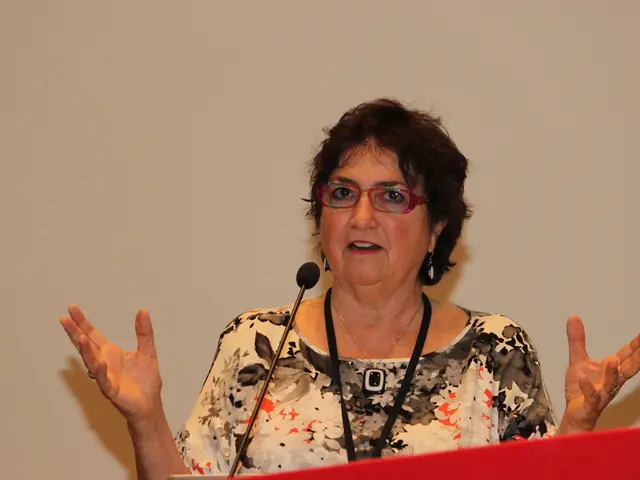Contemporary Views: The Potential Consequences of Georgian Dream's Dual Approach in Tbilisi Could Possibly Rebound
The Georgian Dream party is hitting the rewind button, plunging the nation into a 1984-style reality. Instead of 2024, it seems they're living in an alternate universe where EU membership is a pipe dream. This doublethink game is plain to see, as party leaders bark about EU membership while pursuing policies to purge European values from the country.
For instance, the former prime minister and current GD chairman, Irakli Garibashvili, talked the talk about EU membership on April 20, claiming it's still a dream, but in reality, they're nowhere near ready to dance with the EU. This contradiction is the essence of doublethink — holding two mutually exclusive beliefs and asserting they're both valid.
The best indicator of GD's intentions is the resurrection of a controversial draft bill, aptly named the "foreign agents bill." If enacted as is, this law would blacklist Georgia's booming non-profit sector and independent media outlets, curtailing watchdog activities and making it hard to keep the government in check. It's a recipe that directly contradicts Georgia's constitutionally guaranteed aspiration to join the EU and Brussels' reform requirements for progress on the accession front. This tactic of deliberate sabotage is nothing short of unsettling.
By snubbing the EU and cozying up to Russia, GD is taking a step back from the West and moving closer to Russia's geopolitical orbit. Russian senior officials, like Dmitry Peskov and Sergey Lavrov, have praised GD for this transition. It's no secret they emulate a long-standing law in Russia with this GD legislation.
GD wraps this bill in a doublethink blanket designed to widen society's divide. They claim the legislation adheres to EU standards and promotes transparency about funding sources. They also say the requirements are light, with NGOs and media outlets needing only to file a declaration. But those in Brussels aren't buying it. The President of the European Council, Charles Michel, has dissed GD's alternate reality, stating flatly that the bill is "not consistent with Georgia's EU aspiration."
As parliamentary elections loom this fall, GD's strategic goal is clear: hang onto power and do whatever it takes to make that happen. Whether it's democratic backsliding or embracing Russia-style authoritarian methods, GD has no scruples about using whatever tools at their disposal to keep the throne warm.
They're also taking preventative steps to protect influential leaders from potential secondary sanctions. On April 19, Parliament fast-tracked the "Offshore Law," offering a tax holiday for asset transfers moving from offshore accounts into Georgia. Many believe this legislation was tailor-made for Georgia's grey eminence, Bidzina Ivanishvili, who has a fortune stashed away in Russia. Some observers in Tbilisi think Ivanishvili will be a prime target if sanctions are imposed, so he might be keen to repatriate his money before it becomes a problem.
GD makes use of state-affiliated media, social media pages, and "administrative resources" to amplify their message and discredit any opposition voices. Their narratives aim to strike a chord with national pride by highlighting the protection of "sovereignty and national interests" from foreign interference. Unlike 2023, when mass protests forced GD to backtrack during the first attempt at introducing foreign agents legislation, this time they're upping the ante with new tactics designed to prolong the adoption process. Their ultimate goal is to wear out protesters before the final push to approve the bill, predicted to come in mid-May.
But here's the twist: GD's new tactics aren't dampening opposition to the bill. Protests in Georgia are at an all-time high, with Gen Zers taking the reins. These protests, which are usually led by political parties or public figures, have traditionally attracted little interest from the youth. However, GD's heavy-handed tactics have wounded a powerful segment of the electorate—one that's proven to be highly organized and effective. This transformation in the political landscape poses a significant challenge for Georgian Dream.
Young people in Georgia have traditionally had limited interest in politics, but that's quickly changing. GD overreach has awakened a sleeping giant, one that's capable of turning the tables in the parliamentary elections this fall, provided, of course, the vote is free and fair. The US and EU need to keep a close eye on GD's actions and develop a strategy to hold them accountable for their illiberal steps if they genuinely want to support Georgia's fledgling democracy. Otherwise, Russia-style authoritarian rule might just become Georgia's unfortunate reality.
Enrichment Data:
Georgia's Foreign Agents Registration Act
- This law empowers the government to prosecute media outlets and NGOs for failing to register as "foreign agents," severely limiting independent voices and civil society activities.
- Digital rights activists have warned that if passed, this law would limit media freedom, favoring pro-government media outlets and potentially leading to self-censorship within independent newsrooms.
- The law has been compared to measures taken in other authoritarian states like Azerbaijan, Russia, and Belarus where similar laws have led to the suppression of independent media and civil society organizations.
Impact on EU Accession Bid
- The EU views this law as a serious threat to Georgia's democracy and has deemed the country's EU accession process effectively halted.
- The EU emphasizes that Georgia's future in the EU depends on its commitment to democratic principles and the protection of civil liberties.
- Reversing the current democratic backsliding is seen as a prerequisite for reviving Georgia's EU accession prospects. The EU is pressing Georgia to review its legal framework to ensure its compliance with European standards and its Constitution.
- The Georgian Dream (GD) party's policies contradict their claims of supporting EU membership, as they pursue actions to eliminate European values from the country.
- GD leader, Irakli Garibashvili, speaks of EU membership but admits that Georgia is unprepared to engage with the EU.
- The GD's resurrected "foreign agents bill" threatens Georgia's non-profit sector and independent media outlets, curtailing watchdog activities and making it difficult to oversee the government.
- The "foreign agents bill" aligns with a long-standing Russian law and risks infringing on Georgia's constitutional rights to join the EU.
- EU leaders, like Charles Michel, have rejected GD's portrayal of the bill as EU-compatible and transparency-promoting, deeming it inconsistent with Georgia's EU aspirations.
- GD's intent is to maintain power by any means necessary, including democratic backsliding and adopting Russia-style authoritarian methods.
- The GD is taking steps to protect influential leaders from potential secondary sanctions, such as the swift passage of the "Offshore Law" offering tax exemptions for asset transfers.
- State-affiliated media, social media pages, and administrative resources are being used by GD to amplify their message and suppress opposition voices.
- GD's tactics are aimed at rallying national pride and portraying the protection of sovereignty and national interests as a fight against foreign interference.
- Protests against the "foreign agents bill" have reached an all-time high, with Gen Zers playing a significant role in leading demonstrations.
- GD's overreach has awakened a new political force in Georgia, potentially turning the tables in the upcoming parliamentary elections.
- It's crucial for the US and EU to monitor GD's actions and hold them accountable for their illiberal steps to support Georgia's democracy.
- The passing of the "foreign agents registration act" would limit media freedom, favor pro-government media outlets, and potentially lead to self-censorship within independent newsrooms, as warned by digital rights activists.
- Georgia's EU accession process is at a standstill due to the perceived threat posed by the "foreign agents registration act" to the country's democracy and civil liberties.
- The future of Georgia in the EU depends on its commitment to democratic principles and the protection of civil liberties, as emphasized by the EU.
- Reversing democratic backsliding is seen as a prerequisite for reviving Georgia's EU accession prospects, as the EU continues to pressure the country to review its legal framework to ensure compliance with European standards and its Constitution.








